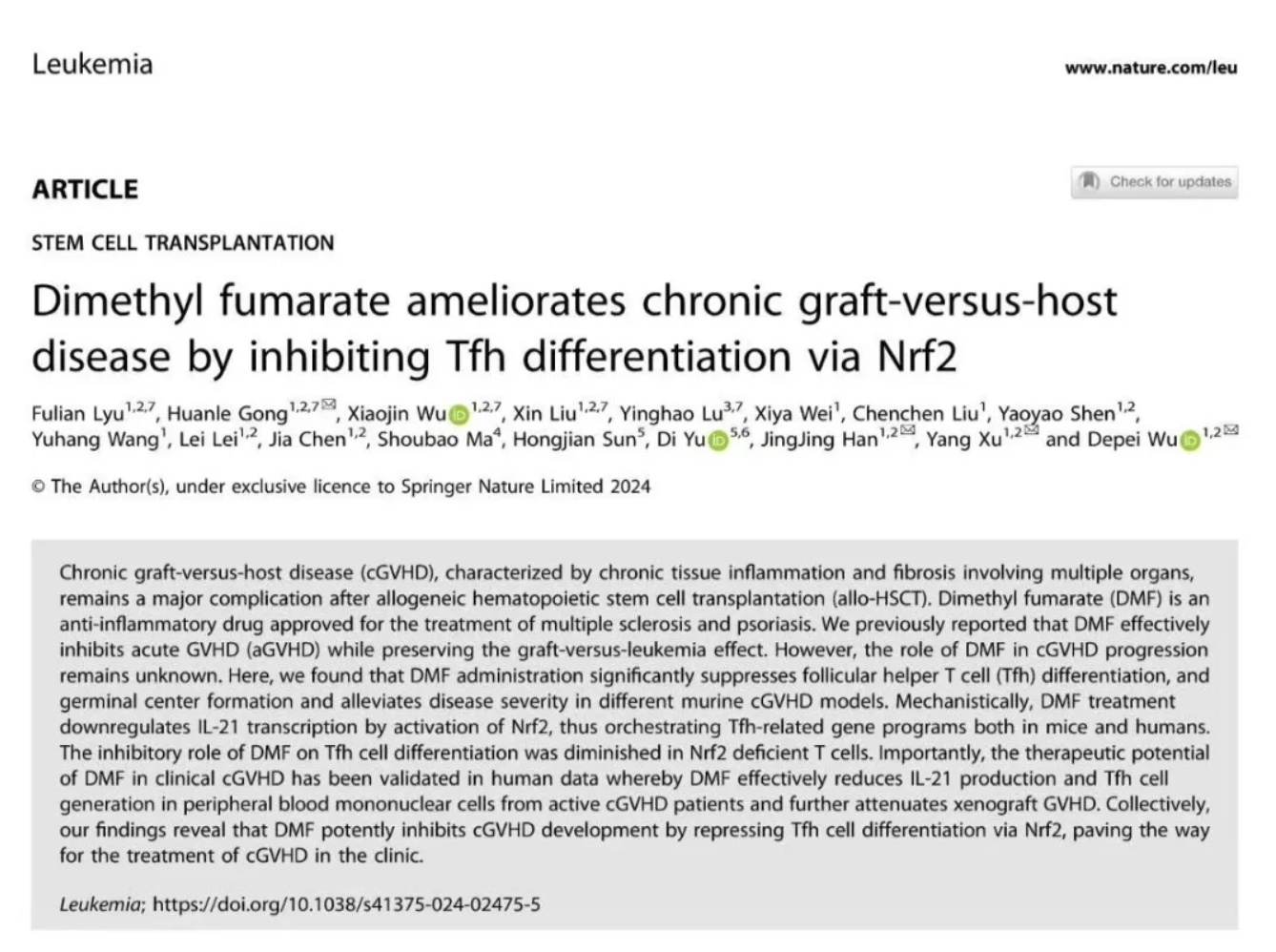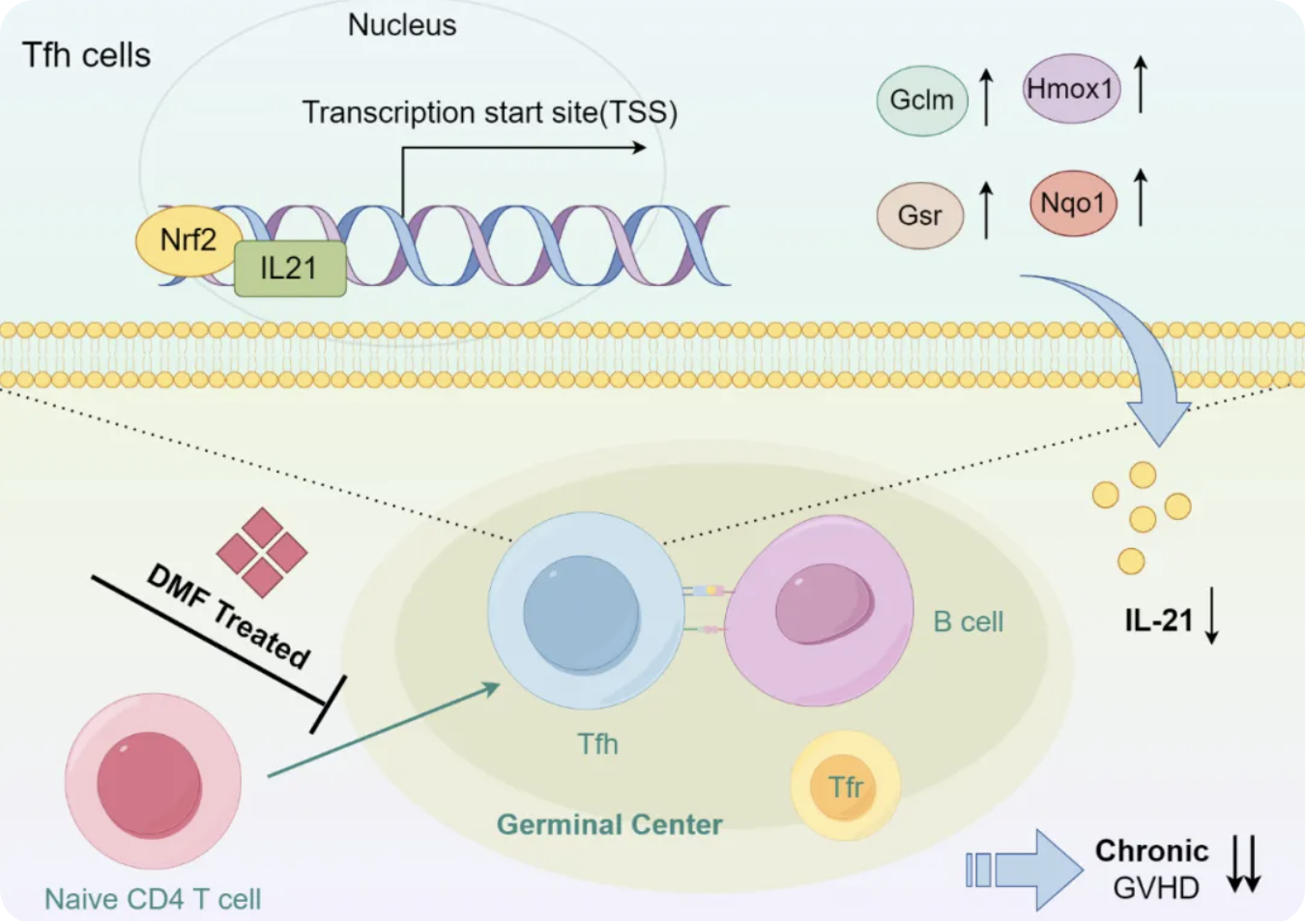2024年11月,国家血液系统疾病临床医学研究中心、苏州大学附属第一医院、苏州大学造血干细胞移植研究所的吴德沛教授和徐杨教授团队在Leukemia杂志(IF=12.8)在线发表了题为“Dimethyl fumarate ameliorates chronic graft-versus-host disease by inhibiting Tfh differentiation via Nrf2”的研究论文,报道了富马酸二甲酯(DMF)通过Nrf2途径抑制Tfh细胞分化从而缓解cGVHD的疾病进展。

慢性移植物抗宿主病(cGVHD)是异基因造血细胞移植(allo-HSCT)后晚期发病率和非复发死亡的主要原因。cGVHD的特征是自身免疫性多器官纤维化病变,如硬皮病、阻塞性支气管炎以及唾液腺、肝脏和肠道纤维化,导致永久性器官功能障碍。临床cGVHD的一线疗法包括皮质类固醇的使用,但是长期大量使用类固醇会增加感染风险,并导致严重的骨质疏松症,从而大大降低患者的生活质量。由于对cGVHD发病的细胞和分子机制缺乏深入了解,目前的治疗效率受到了影响。因此,新型治疗策略对于预防和治疗cGVHD至关重要。
在本研究中,建立了小鼠硬皮样和狼疮样cGVHD模型,发现DMF均能显著降低脾脏中滤泡辅助性T细胞(Tfh)、生发中心B细胞(GCB)的比例,从而减轻疾病的发生发展。通过体外实验及其分子机制的探讨,结果显示DMF可能是通过上调Nrf2减少IL-21的分泌,从而抑制Tfh细胞的分化。最后,通过对cGVHD患者的临床样本验证,DMF能显著抑制外周血PBMCs中Tfh的生成及IL-21的产生,并减轻异种移植的GVHD。综上所述,本研究揭示DMF减轻cGVHD的新型分子机制,为治疗临床 cGVHD 提供了一种潜在的治疗策略。

该研究得到科技部重点研发计划、国家自然科学基金委、国家血液系统疾病临床医学研究中心、江苏省科技厅等多个科研资金的支持。本课题得到澳大利亚健康与医学科学院、昆士兰大学余迪院士,陈之岸研究员,孙宏健博士,希望之城马守宝教授等的大力支持。 国家血液系统疾病临床医学研究中心吴德沛教授、徐杨教授、龚欢乐博士、韩晶晶博士为本文共同通讯作者,吕福莲、龚欢乐、吴小津、刘鑫、卢英豪为本文的共同第一作者。原文摘要:Chronic graft-versus-host disease (cGVHD), characterized by chronic tissue inflammation and fibrosis involving multiple organs, remains a major complication after allogeneic hematopoietic stem cell transplantation (allo-HSCT). Dimethyl fumarate (DMF) is an anti-inflammatory drug approved for the treatment of multiple sclerosis and psoriasis. We previously reported that DMF effectively inhibits acute GVHD (aGVHD) while preserving the graft-versus-leukemia effect. However, the role of DMF in cGVHD progression remains unknown. Here, we found that DMF administration significantly suppresses follicular helper T cell (Tfh) differentiation, and germinal center formation and alleviates disease severity in different murine cGVHD models. Mechanistically, DMF treatment downregulates IL-21 transcription by activation of Nrf2, thus orchestrating Tfh-related gene programs both in mice and humans. The inhibitory role of DMF on Tfh cell differentiation was diminished in Nrf2 deficient T cells. Importantly, the therapeutic potential of DMF in clinical cGVHD has been validated in human data whereby DMF effectively reduces IL-21 production and Tfh cell generation in peripheral blood mononuclear cells from active cGVHD patients and further attenuates xenograft GVHD. Collectively, our findings reveal that DMF potently inhibits cGVHD development by repressing Tfh cell differentiation via Nrf2, paving the way for the treatment of cGVHD in the clinic.
原文链接:https://www.nature.com/articles/s41375-024-02475-5